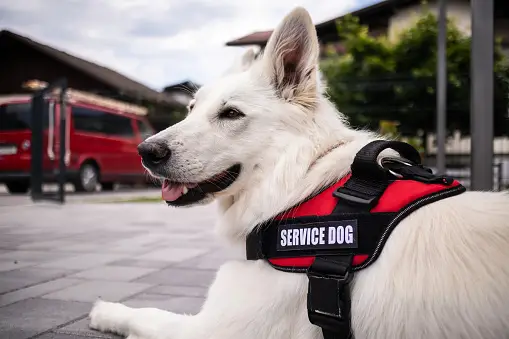Service dogs are unsung heroes, providing indispensable support and assistance to individuals with disabilities. Their unwavering dedication, rigorous training, and profound impact on the lives of their handlers merit not just admiration but also greater recognition and appreciation from society. These remarkable canines go above and beyond in their service, embodying loyalty, skill, and compassion, deserving of more acknowledgment and support from humans.
Recognizing Their Contributions
Exceptional Assistance: Service dogs undergo extensive training to perform a wide range of tasks tailored to their handler’s specific needs. From guiding individuals with visual impairments to alerting to seizures or providing mobility assistance, these dogs exhibit exceptional skills that significantly improve the quality of life for their handlers.
Emotional Support: Beyond their trained tasks, service dogs offer emotional support and companionship. Their constant presence provides a sense of security, independence, and confidence to individuals living with disabilities, enhancing their overall well-being.
Ways to Award Service Dogs
Public Recognition: Raising awareness about the invaluable contributions of service dogs is crucial. Public recognition through social media campaigns, ceremonies, or events can highlight their achievements and emphasize the significance of their role in society.
Education and Respect: Educating the public about service dog etiquette and the importance of not distracting or interfering with these working animals is essential. Respect for their role and allowing them to perform their tasks undisturbed is a form of acknowledgment and appreciation.
Veterinary Care and Well-being: Ensuring the health and well-being of service dogs is vital. Access to quality veterinary care, regular check-ups, proper nutrition, and comfortable living conditions are essential to honor their service.
Financial Support: Funding organizations that train and provide service dogs can help ensure the availability of these highly trained animals to those in need. Supporting these organizations financially or through volunteer efforts contributes to the continuation of their crucial work.
Advocating for Greater Support
Policy Changes: Advocacy for policies that provide more comprehensive protections and accommodations for service dogs and their handlers is vital. Expanding legal protections in various settings and ensuring access to public spaces without discrimination is essential.
Appreciation Programs: Establishing appreciation programs or awards to honor outstanding service dogs and their handlers can elevate their recognition and highlight their contributions to society.
Service dogs are true heroes, selflessly dedicating themselves to enhancing the lives of individuals with disabilities. Their loyalty, intelligence, and unwavering commitment exemplify the very best in canine companionship. It’s incumbent upon us as a society to acknowledge, appreciate, and honor these extraordinary animals for their invaluable service and contributions. By recognizing their efforts, providing adequate care, and advocating for their rights, we can ensure that service dogs receive the respect and gratitude they rightfully deserve. The impact they make goes far beyond their tasks—they are companions, helpers, and beloved family members, deserving of our utmost appreciation and recognition.



